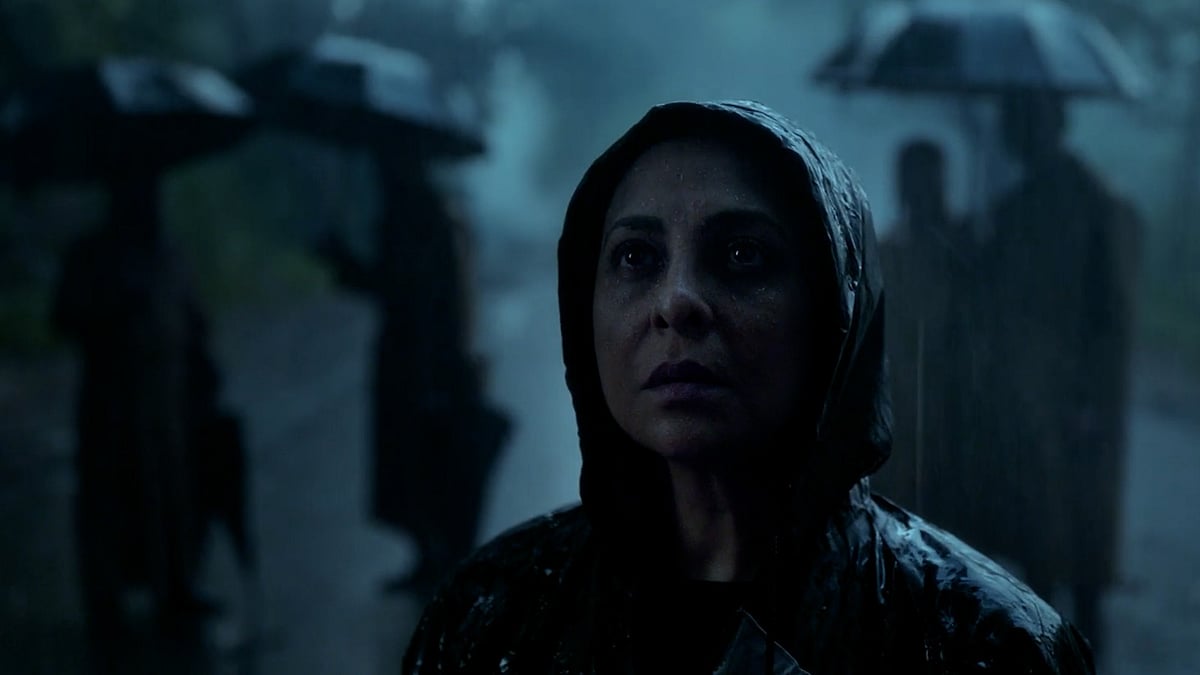'Delhi Crime Season 3' Explores the Dark Nexus of Trafficking and Power
Huma Qureshi is undoubtedly the best part of the season.

advertisement
In 2019, Delhi Crime helped define the now-ubiquitous Indian crime drama. Amid hyper-masculine cop thrillers in mainstream Hindi cinema, the series centered on a senior female officer investigating one of India’s most widely documented cases of heinous sexual violence.
Richie Mehta successfully merged the horror of the case with the suspense of a police procedural, creating a gritty crime drama with a realistic aesthetic. Today, Deputy Inspector General (DIG) Vartika Chaturvedi (Shefali Shah) returns in a vastly different streaming ecosystem—now saturated with such shows that have sought to replicate this magic, with varying degrees of success. Season 2 was competent but failed to hit the high notes of the first.
Two Cases, One Systemic Nightmare
The series opens with a wedding in Rohtak, Haryana, where a bride gets cold feet and protests against her marriage. In the most uneventful manner, she is swiftly sent away to the “girls’ hostel” and replaced by another bride.
This chilling occurrence appears to be part of a larger network helmed by Badi Didi (Huma Qureshi). DIG Chaturvedi is deployed to what she calls a “punishment” posting in Silchar, Assam. At a checkpoint, she and her colleagues discover a truck full of girls being trafficked. The destination? Azadpur, Delhi.
Rasika Dugal in a still from Delhi Crime S3.
(Photo Courtesy: YouTube))
In the capital, DCP Neeti Singh (Rasika Dugal) is investigating a disturbing case inspired by the 2012 story of Baby Falak—a two-year-old girl left at the AIIMS Trauma Centre with bite marks on her cheek and a severe head injury. CCTV footage shows a young woman dropping the baby off and fleeing.
Patriarchy, Poverty, and Power
Delhi Crime Season 3 attempts to do a lot in six episodes—much of which it manages to pull off successfully. It works as a gripping, suspenseful crime drama. While it doesn’t always keep us on our toes or guessing the next step—at times it can feel predictable—it still maintains sufficient tension.
The show doubles as a sociological exploration of patriarchy and capitalism in India. Rather than exceptionalising the evil nature of Badi Didi and her team, the series situates their actions within the economic and social desperation that drives girls to trust her.
Many are escaping poverty or abuse, some have been sold by their parents, while others have been lured under false pretenses of legitimate jobs. Badi Didi preys on these girls’ vulnerability, promising them a better, more prosperous future.
Some scenes where characters spell out the themes to us and dictate how we should feel, are less impactful—such as when Vartika tells her daughter, Chandni (Yashaswini Dayama), about her first raid in a brothel and the “hopelessness” she saw in the sex workers’ eyes. “No one misses missing girls,” she says. Or when Neeti and Sub-Inspector Vimla Bharadwaj discuss how girls in India get forced into sex work or marriage, and “either way, they are trapped.”
A Standout Huma Qureshi and an Underused Supporting Cast
Huma Qureshi in a still from Delhi Crime S3.
(Photo Courtesy: YouTube)
Meena is acutely aware of the ways of the world and the commodification of women and their labour—from marriage to sex work to domestic work.
She sees herself as a businesswoman making the best of grim circumstances. She’s ruthlessly ambitious. Qureshi captures her charisma and tenacity with flair, giving us a memorable counterpoint to DIG Chaturvedi’s moral righteousness.
Equally magnetic is Sayani Gupta as Meena’s right-hand, though she's underused—as are other members in Vartika’s team, including Bhupendra Singh (Rajesh Tailang), Jairaj Singh (Anurag Arora), and Sudhir Kumar (Gopal Datt), all of whom deserve more screen time.
Missed Opportunities and Discomfort
This is most jarring when it comes to Vartika’s daughter, Chandni, who we’re told is a journalist in the first episode—only for that detail to never resurface in any meaningful way. It’s a shame, given how rich the premise is: the daughter of two of Delhi’s most senior cops working as a journalist covering crime.
Meanwhile, it constantly exalts the Delhi Police’s bravery, hard work, and valour. At one point, for instance, DIG Chaturvedi offhandedly remarks that the “Delhi Police never sleeps”—a line that encapsulates the show’s uncritical reverence for law enforcement.
Court protocols and custody rules are treated as mere inconveniences that hinder the police’s ability to solve the case. While some degree of glorification is unavoidable in police procedurals, others like Paatal Lok, Dahaad, and Kohrra go much further in critiquing the police and carceral system itself.
Ultimately, Delhi Crime Season 3 is a satisfying watch and leaves a solid impact—though never as much as the first. Despite a few bumps, we remain in the steady, if overly reverent, hands of Vartika Chaturvedi and her Delhi Crime team.
The series releases on Netflix on 13 November.
(Kaashif is a writer and film critic from Mumbai, currently based in London. He is the Assistant Culture Editor of The Polis Project.)